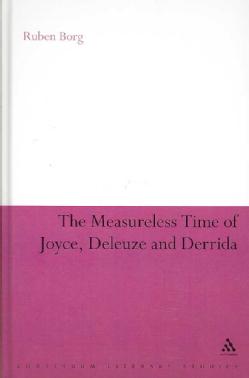In the Physics Aristotle describes time as something that either does not exist or exists barely and in an obscure manner. Ruben Borg argues that an attempt to grapple with this problem informs the narrative structure, imagery and complex rhetorical strategies of Ulysses and Finnegans Wake. By examining the relation between time and processes of figuration in Joyce’s fiction, this study engages with the challenges of grasping time as a multiplicity that resists representation and objective measurement. Joyce’s lexical and rhetorical inventions are viewed as an attempt to describe time’s characteristic movement in terms of waste, measureless excess or fading.
If, as Ruben Borg masterfully shows, Joyce’s ambition was to write a history of time with Finnegans Wake, it could not be a “short history of time,” something like a universal history, nor even a very long and dark and tangled story about an Irish family. It would have to be an almost infinite and unimaginable experience, a radical attempt to make us relive the origins of language. With a rare blend of literary and philosophical expertise, Borg unfolds hitherto unexplored dimensions of the Wake and inscribes it definitively in a discursive tradition marked by the clash of warring brothers (like Shem and Shaun): Bruno and Vico, Bergson and Heidegger, Derrida and Deleuze.
Jean-Michel Rabaté, University of Pennsylvania
*
That time is an obscure if not impossible object for thought is, in Borg’s analysis, the central problematic that structures Finnegans Wake. He argues that it is Joyce's attempt to present the “unthinkable form of time” that motivated many of the Wake's formal innovations. In making this claim, Borg deftly balances lucid formal analysis with a mastery of relevant and quite extensive philosophical history, showing how literary innovation yields conceptual insights that have eluded more conventional discourses. Linking Finnegans Wake to post-structuralist theories of temporality and subjectivity enables Borg to rethink recent theoretical articulations of what it means to be “posthuman” — a category whose importance continues to be felt across many fields.
Borg’s book prompts us to think through the theological tradition that historically precedes and grounds the somewhat recent conception of the “posthuman,” and this may be the most provocative of the many contributions made by The Measureless Time of Joyce, Deleuze and Derrida. [...] In addition, the study is unique for deftly adapting Katherine Hayles’s more recent category of the “posthuman” to questions of time and narratology. Borg's elegant prose integrates a masterful understanding of the Wake with an equally impressive command of the relevant history of philosophy. He makes a compelling case for reading Finnegans Wake as a unique site in which the unthinkable structure of time itself can be thought.
Andrew Gaedtke, University of Illinois at Urbana-Champaign
*
The rational scheme on which the book is organised will facilitate a deeper understanding of the basic epistemological questions at stake within deconstructionism itself (in spite of the complexity usually associated with the works of Derrida and Deleuze), accentuating how powerful their thought is when applied to literary critique. Overall, this book is an outstanding post-structuralist work that shows how self-knowledge, which is in many points of view the very first task of philosophy, necessarily entails a compromise with rhetorics, as well as with a supplement of materiality.
Beatrice Boatto, Ca’ Foscari University of Venice
Keywords: Joycean Temporalities; Joyce and the Nonhuman Turn; Posthuman Temporalities; Time and Figuration; Posthuman Modernism.


